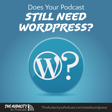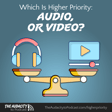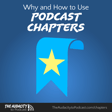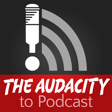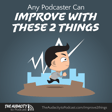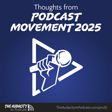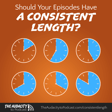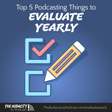
How to Use Podcast Transcripts
Transcripts have long been promoted as ways to make your podcast more findable and accessible. But it's only recently that podcast transcripts have become actually useful!
Although I didn't plan it this way, the timing of this episode is perfect because I just launched a new feature on Podgagement that automatically transcribes audio feedback from your audience!
This topic is also very timely because of the release of iOS 17.4, which brings podcast transcripts into Apple Podcasts!
(As an affiliate, I earn from qualifying purchases through some of these following links. But I recommend things I truly believe in, regardless of earnings.)
1. Don't believe the myths about podcast transcripts
For many years, people have been promoting transcripts for the wrong reasons. I've also been pitched by many transcription companies pushing the wrong approach.
While there are elements of truth in these two common myths, the ways people often promote and understand these two ideas are where the information become myth—of “mythinformation”?
Myth 1: “Transcripts are good for podcast SEO”
People have often said that you should publish podcast transcripts on your website to make your podcast findable through search-engine optimization (SEO). But that's not the full truth.
Yes, transcripts are better than nothing or a mere paragraph or list of topics. But transcripts result in a lot of words and actually very little content, resulting in very low quality writing (probably even worse than AI-created text or writing from non-natives of the language).
For example, a two-cohost podcast transcript might look like this:
Jack: Welcome to the our podcast, where we talk about things to help you do stuff! I'm Jack!
Jill: And I'm Jill.
Jack: Before we get into this topic, how are you doing, Jill?
Jill: The weather is sunny today, so I'm great!
Jack: Great!
Jill: Yeah. What about you?
Jack: I'm fine, but I don't know what the weather is, but—
Jill: That's sad.
Jack: What do mean?
Jill: I mean, you're saying that you haven't gone outside or even looked out a window in a while.
Jack: Yeah, but it's okay.
Jill: So anyway!
Jack: Yes! Let's jump into this week's topic.
…
Note that in this fictional example, there are a lot of words, but you've learned nothing from this excerpt!
That kind of back-and-forth is fine in a conversation and can even sometimes be okay in a podcast. But it writing, it becomes worthless.
Compare that to how the same “information” could be written in a way that's valuable:
Actually, that whole exchange could be edited out of the written content because there's little to no value in reading that!
Search engines prioritize high-quality content that is readable, but unless you're a professional speaker performing a refined monologue, transcripts are neither readable nor high quality. So, no, transcripts are not the “magic bullet” to making your podcast perform well for SEO, especially if you're relegating transcripts to a downloadable file or a web page separate from your podcast episode.
Myth 2: “Transcripts make your podcast accessible”
It's true that people with hearing impairments still consume podcasts! Thus transcripts have been lauded as the accessibility solution podcasts need!
But the problem is that most published transcripts are still difficult to read or—worse—are buried in a link or download
